The AMD Ryzen Threadripper 1950X and 1920X Review: CPUs on Steroids
by Ian Cutress on August 10, 2017 9:00 AM ESTCPU Encoding Tests
One of the interesting elements on modern processors is encoding performance. This includes encryption/decryption, as well as video transcoding from one video format to another. In the encrypt/decrypt scenario, this remains pertinent to on-the-fly encryption of sensitive data - a process by which more modern devices are leaning to for software security. Video transcoding as a tool to adjust the quality, file size and resolution of a video file has boomed in recent years, such as providing the optimum video for devices before consumption, or for game streamers who are wanting to upload the output from their video camera in real-time. As we move into live 3D video, this task will only get more strenuous, and it turns out that the performance of certain algorithms is a function of the input/output of the content.
All of our benchmark results can also be found in our benchmark engine, Bench.
7-Zip 9.2: link
One of the freeware compression tools that offers good scaling performance between processors is 7-Zip. It runs under an open-source licence, is fast, and easy to use tool for power users. We run the benchmark mode via the command line for four loops and take the output score.
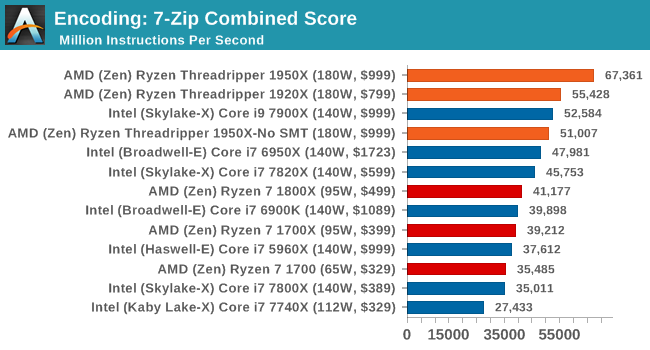
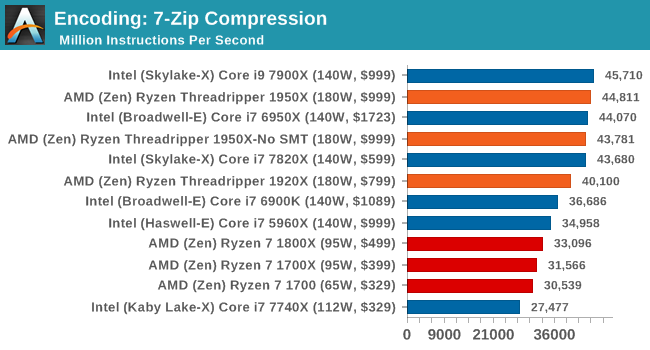
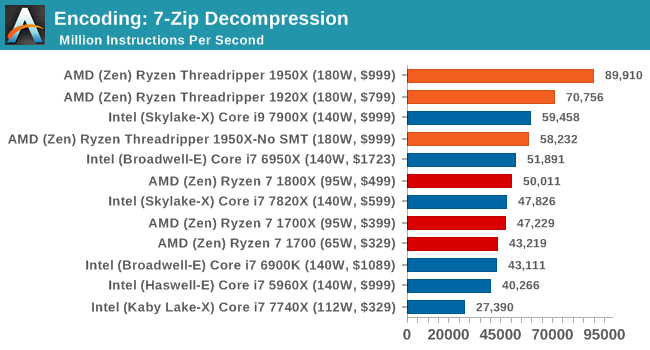
At the request of a few users, we've gone back through our saved benchmark data and pulled out compression/decompression numbers for 7-zip. AMD clearly makes a win here in decompression by a long way.
WinRAR 5.40: link
For the 2017 test suite, we move to the latest version of WinRAR in our compression test. WinRAR in some quarters is more user friendly that 7-Zip, hence its inclusion. Rather than use a benchmark mode as we did with 7-Zip, here we take a set of files representative of a generic stack (33 video files in 1.37 GB, 2834 smaller website files in 370 folders in 150 MB) of compressible and incompressible formats. The results shown are the time taken to encode the file. Due to DRAM caching, we run the test 10 times and take the average of the last five runs when the benchmark is in a steady state.
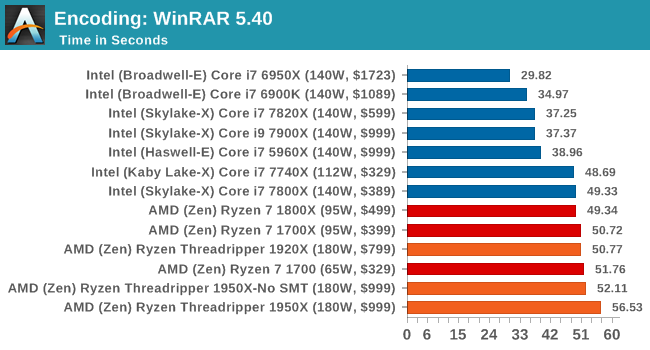
WinRAR encoding is another test that doesn't scale up especially well with thread counts. After only a few threads, most of its MT performance gains have been achieved. Which isn't a help to Threadripper, and is outright a hiderence in Creator Mode.
AES Encoding
Algorithms using AES coding have spread far and wide as a ubiquitous tool for encryption. Again, this is another CPU limited test, and modern CPUs have special AES pathways to accelerate their performance. We often see scaling in both frequency and cores with this benchmark. We use the latest version of TrueCrypt and run its benchmark mode over 1GB of in-DRAM data. Results shown are the GB/s average of encryption and decryption.
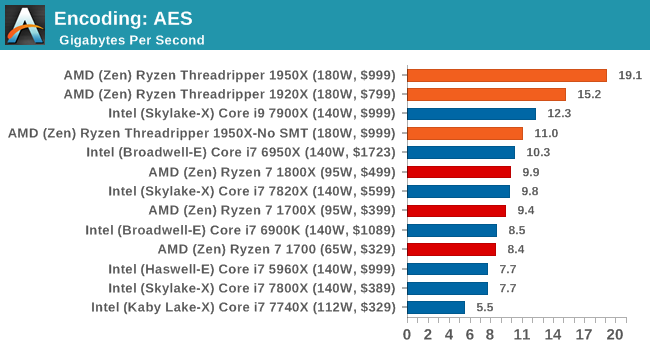
HandBrake v1.0.2 H264 and HEVC: link
As mentioned above, video transcoding (both encode and decode) is a hot topic in performance metrics as more and more content is being created. First consideration is the standard in which the video is encoded, which can be lossless or lossy, trade performance for file-size, trade quality for file-size, or all of the above can increase encoding rates to help accelerate decoding rates. Alongside Google's favorite codec, VP9, there are two others that are taking hold: H264, the older codec, is practically everywhere and is designed to be optimized for 1080p video, and HEVC (or H265) that is aimed to provide the same quality as H264 but at a lower file-size (or better quality for the same size). HEVC is important as 4K is streamed over the air, meaning less bits need to be transferred for the same quality content.
Handbrake is a favored tool for transcoding, and so our test regime takes care of three areas.
Low Quality/Resolution H264: Here we transcode a 640x266 H264 rip of a 2 hour film, and change the encoding from Main profile to High profile, using the very-fast preset.
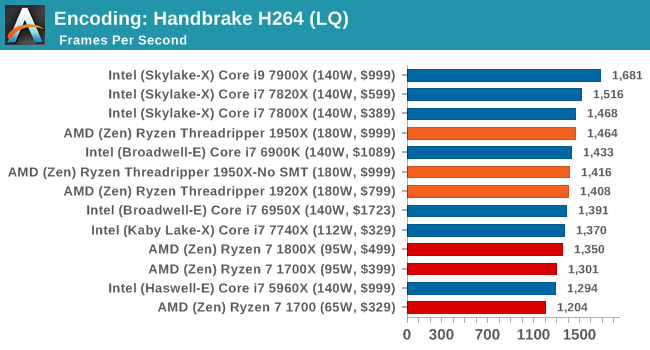
High Quality/Resolution H264: A similar test, but this time we take a ten-minute double 4K (3840x4320) file running at 60 Hz and transcode from Main to High, using the very-fast preset.
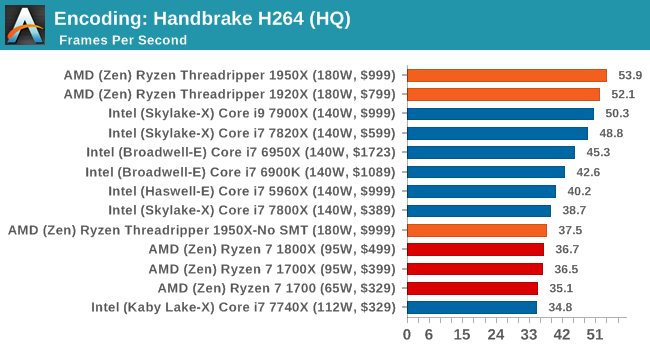
HEVC Test: Using the same video in HQ, we change the resolution and codec of the original video from 4K60 in H264 into 4K60 HEVC.
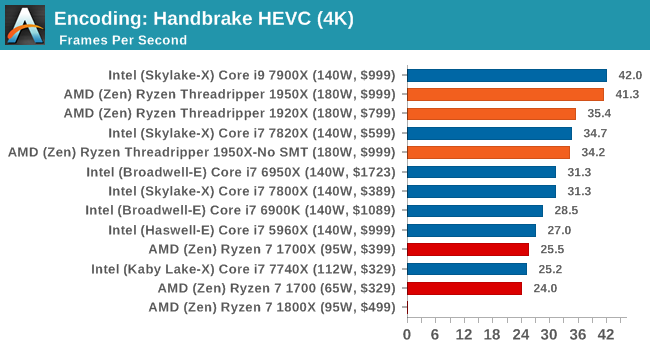
In the HQ H264 test, AMD pushes ahead with both the processors, while SMT-off severely limits the 1950X due to the lack of SMT threads. As we move to HEVC though, the 1950X and 7900X clash on performance.










347 Comments
View All Comments
bigboxes - Friday, August 11, 2017 - link
You're acting just like the fanboi trolls you claim to loathe.Alexvrb - Sunday, August 13, 2017 - link
Yeah that was definitely a pot<->kettle comment. LOL.trivor - Saturday, August 12, 2017 - link
For those of you considering this CPU the fact is you are going to get MUCH better value by choosing one of the Ryzen CPUs - Ryzen 7 1800X is now at around $420 for 8/16 and the 7 1700 (8/16 again) has been on sale for as little as $299. Now, if you need the high thread counts for work on things like content creation and you still want to be able to run games it will be competitive (read: not the king of the hill) when you are running your games. So, if you do more than 50% of your computing time is gaming then go for an Intel CPU OR one of the Ryzen 5/7 consumer CPUs.Lord of the Bored - Friday, August 11, 2017 - link
Which would explain why the introduction doesn't mention the Netburst fiasco by name."The company that could force the most cycles through a processor could get a base performance advantage over the other, and it led to some rather hot chips, with the certain architectures being dropped for something that scaled better. " is, to my eye, actually attention-grabbing in the way it avoids using any names like Preshott, I mean Prescott and only obliquely references the 1GHz Athlon, the Thunderbirds, Sledgehammer, and the whole Netburst fiasco that destroyed the once-respected Pentium name.
But no, let's just say that "certain architectures" were dropped and there were "some rather hot chips" and keep Intel happy. They need that bone right now, though not as much as they did during the reign of Thunderbird and the 'hammers.
Hurr Durr - Friday, August 11, 2017 - link
If the unword "NetBurst" triggers you so much, it`s not processors you should spend money on, but shrinks.Lord of the Bored - Friday, August 11, 2017 - link
Hey, we were an Athlon house. I didn't suffer through the series of mis-steps that plagued Intel. I just thought the sentence was conspicuous in how hard it tried to not name names.mlambert890 - Saturday, August 12, 2017 - link
"name names"? There are 2 companies that make CPUs. Everyone knows Netburst was Intel P4 era. It's not Watergate ok?Conspiracy obsession has become a legitimate mental illness.
fallaha56 - Thursday, August 10, 2017 - link
handy not to show the new Intel chip struggle eh?Breit - Friday, August 11, 2017 - link
Is it possibly to bench the Intel CPUs (especially the i9-7900x) for those latency/single-thread tests with Hyperthreading turned off? This would probably give a better comparison to AMDs Game Mode and hopefully higher numbers too due to double the cache/registers available to one thread.cheshirster - Friday, August 11, 2017 - link
Skylake-X sucks at gaming.7800X is slower than 1600X.